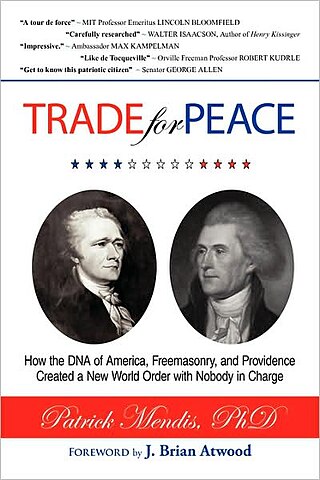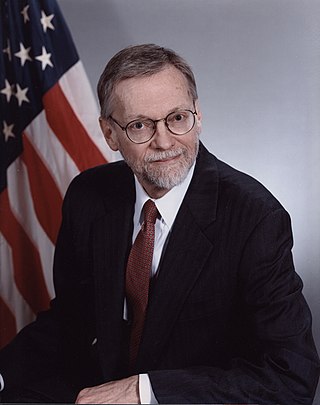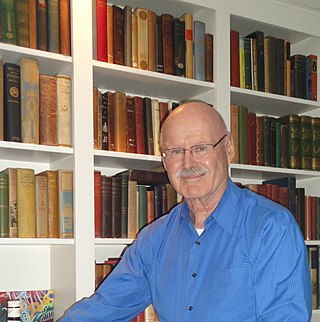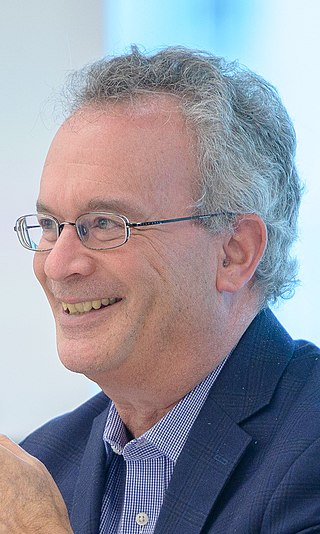The Kluge Scholars Council is a body of distinguished scholars, convened by the Librarian of Congress to advise on matters related to scholarship at the Library, with special attention to the John W. Kluge Center and the Kluge Prize. Through discussion and reflection, the Council assists in implementing an American tradition linking the activities of thinkers and doers, those who are engaged in the world of ideas with those engaged in the world of affairs.

Robert Owen Keohane is an American political scientist working within the fields of international relations and international political economy. Following the publication of his influential book After Hegemony (1984), he has become widely associated with the theory of neoliberal institutionalism in international relations, as well as transnational relations and world politics in international relations in the 1970s.
Joseph J. Fins, M.D., D. Hum. Litt., M.A.C.P., F.R.C.P. is an American physician and medical ethicist. He is chief of the Division of Medical Ethics at New York Presbyterian Hospital and Weill Cornell Medical College, where he serves as The E. William Davis Jr., M.D. Professor of Medical Ethics, and Professor of Medicine, Professor of Public Health, and Professor of Medicine in Psychiatry. Fins is also Director of Medical Ethics and an attending physician at New York Presbyterian Hospital-Weill Cornell Medical Center. Fins is also a member of the adjunct faculty of Rockefeller University and has served as Associate for Medicine at The Hastings Center. He is the Solomon Center Distinguished Scholar in Medicine, Bioethics and the Law and a Visiting Professor of Law at Yale Law School. He was appointed by President Bill Clinton to The White House Commission on Complementary and Alternative Medicine Policy and currently serves on The New York State Task Force on Life and the Law by gubernatorial appointment.

Richard Jeffrey Danzig is an American politician and lawyer who served as the 71st Secretary of the Navy under President Bill Clinton. He served as an advisor of the President Barack Obama during his presidential campaign and was later the chairman of the national security think-tank, the Center for a New American Security.
Catherine Bertini is an American public servant. She is the 2003 World Food Prize Laureate. She was the Executive Director of the United Nations World Food Program from 1992 to 2002. She served as the UN Under-Secretary for Management from 2003 to 2005. Currently she is a distinguished fellow at the Chicago Council on Global Affairs, the Chair of the Board of the Global Alliance for Improved Nutrition (GAIN) and the Chair of the Executive Board of the Crop Trust.

The President's Council of Advisors on Science and Technology (PCAST) is a council, chartered in each administration with a broad mandate to advise the president of the United States on science and technology. The current PCAST was established by Executive Order 13226 on September 30, 2001, by George W. Bush, was re-chartered by Barack Obama's April 21, 2010, Executive Order 13539, by Donald Trump's October 22, 2019, Executive Order 13895, and by Joe Biden's February 1, 2021, Executive Order 14007.
A Luce Scholar is a recipient of a cultural exchange and vocational fellowship sponsored by the Henry Luce Foundation, a private foundation established by Time, Inc. founder Henry R. Luce.

Yossi Shain was a member of the Knesset for Yisrael Beiteinu. He is also the Romulo Betancourt Professor of Political Science at Tel Aviv University where he also serves as head of TAU's School of Political Science, Government and International Affairs, head of the Abba Eban Graduate Studies Program in Diplomacy and director of the Frances Brody Institute for Applied Diplomacy. He is also a full professor of comparative government and diaspora politics at Georgetown University, and the founding director of the Program for Jewish Civilization (PJC) at Georgetown. In 2007, he also served (pro-bono) as president of Western Galilee College. Shain earned his B.A. and M.A. degrees from Tel Aviv University and received his Ph.D. in political science from Yale University in 1988. In July 2016 Professor Shain was appointed as a member of Council for Higher Education in Israel, and he is now heading the national committee in charge in rejuvenating liberal arts and the humanities.

Patrick Mendis is an educator, diplomat, author, and executive in government service in the United States. A former American diplomat and military professor during the Clinton, Bush, and Obama administrations, he held various positions in the U.S. Departments of Agriculture, Defense, Energy, and State. He was appointed twice as a commissioner of the U.S. National Commission for UNESCO at the State Department by the Obama administration. His appointment to the UNESCO Commission ended during the Trump administration when the White House withdrew from the UN agency.
Theodore Wood Friend III was an American historian, novelist, and teacher, and a former president of Swarthmore College.
Marc Leon Nerlove was an American agricultural economist and econometrician and a distinguished university professor emeritus in agricultural and resource economics at the University of Maryland. He was awarded the John Bates Clark Medal from the American Economic Association (AEA) in 1969 and held appointments at eight different universities from 1958–2016. The Clark Medal is awarded to an economist under the age of 40 who “is judged to have made the most significant contribution to economic thought and knowledge”, and when the AEA appointed him as a distinguished fellow in 2012, they cited his development of widely used econometric methods across a range of subjects, including supply and demand, time series analysis, production functions, panel analysis, and family demography.
The Stanton Foundation is a private foundation established by Frank Stanton, a long-time president of Columbia Broadcasting System ("CBS"). The Foundation focuses primarily on three areas in which Stanton was unable to complete his philanthropic plans within his lifetime: (1) supporting the First Amendment and creating a more informed citizenry, particularly in regard to civic issues, (2) supporting policy research in international security, with special emphasis on nuclear security and (3) advancing canine welfare. The Stanton Foundation is primarily a "no unsolicited proposals" foundation, although it operates several open application programs as detailed on its website.

Donald James Baker is an American scientist who was trained as a physicist, practiced as an oceanographer, and has held science and management positions in academia, non-profit institutions, and government agencies. He a former Under Secretary of Commerce for Atmosphere and Oceans and administrator of the U.S. National Oceanic and Atmospheric Administration (NOAA), and currently director, Global Carbon Measurement Program, William J. Clinton Foundation working with forestry programs in developing countries with the aim of reducing carbon dioxide emissions and at the same time helping alleviate poverty.

Kathleen Mathea Falco is an American lawyer who is a expert in drug abuse prevention and treatment who served as the first U.S. Assistant Secretary of State for International Narcotics and Law Enforcement Affairs during the Carter Administration. Currently, Falco is the President of Drug Strategies, a nonprofit research institute based in Washington, D.C., which she created with the support of major foundations in 1993 to identify and promote more effective approaches to substance abuse and international drug policy.

Tan Tai Yong is a Singaporean academic who is the current President of Singapore University of Social Sciences. He served as the President of Yale-NUS College from 2017 to 2022. He is also Chairman of the Management Board of the Institute of South Asian Studies, an autonomous university-level research institute in NUS. He was a former Nominated Member of Parliament and served from 2014 to 2015.
Rohini Pande is an economist who is currently the Henry J. Heinz II Professor of Economics and Director of the Economic Growth Center at Yale University. She was previously the Rafik Hariri Professor of International Political Economy and Mohammed Kamal Professor of Public Policy at Harvard Kennedy School. Pande was the Co-Director of Center for International Development at Harvard University's Evidence for Policy Design research program (EPoD) and serves on the board of directors of the Abdul Latif Jameel Poverty Action Lab, MIT. She also serves on the board of the Bureau for Research and Economic Analysis of Development (BREAD), the Committee on the Status of Women in the Economic Profession (CSWEP) and as a co-editor of the American Economic Association's (AEA) journal American Economic Review: Insights. She is a Faculty Research Associate at NBER, CEPR and the IFPRI. Her research focuses on the economic analysis of the politics and consequences of different forms of redistribution, principally in developing countries. Her outstanding and empirical findings in fields of governance and accountability, women’s empowerment, role of credit in poverty, the economic aspects of the environment and the potential of policy design in these areas, won her the Infosys Prize 2022 in Social Sciences.

Michael Craig Hudson was an American political scientist, the director of the Middle East Institute and professor of political science at the National University of Singapore. He was also professor emeritus at Georgetown University, where he was professor of international relations since 1979 and Saif Ghobash Professor of Arab Studies since 1980 in the Edmund A. Walsh School of Foreign Service. While at Georgetown, Hudson served as director of the Center for Contemporary Arab Studies intermittently for over twenty years, most recently from 2007 to 2010.

James M. Goldgeier is a professor of international relations at the School of International Service at American University in Washington, D.C., where he served as dean from 2011 to 2017.
Jennifer Ann Clapp is a Canadian political economist. She is a Professor and Canada Research Chair in Global Food Security and Sustainability at the University of Waterloo.
Carlisle Ford Runge is a professor of applied economics and law at the University of Minnesota.









